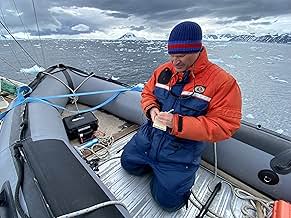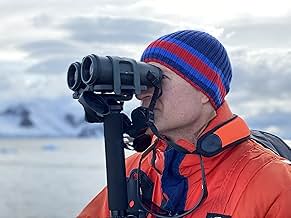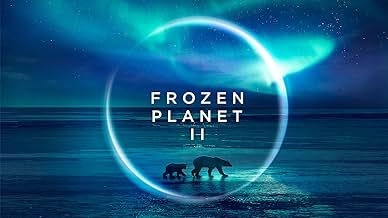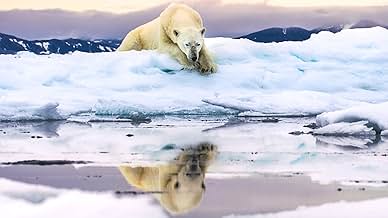ÉVALUATION IMDb
9,0/10
2,5 k
MA NOTE
Il suit la vie dans tout le quart gelé de la planète, y compris les ours polaires, les tigres de Sibérie, les singes des neiges et les pingouins.Il suit la vie dans tout le quart gelé de la planète, y compris les ours polaires, les tigres de Sibérie, les singes des neiges et les pingouins.Il suit la vie dans tout le quart gelé de la planète, y compris les ours polaires, les tigres de Sibérie, les singes des neiges et les pingouins.
- Nominé pour le prix 2 BAFTA Awards
- 2 victoires et 6 nominations au total
Parcourir les épisodes
Avis en vedette
Each time I watch one of the BBC wildlife series, especially those narrated by Sir David Attenborough, I'm always blown away by the level of detail and camera angles the production of team achieve.
The latest series have just upped the game, an early sequence with Killer Whales is simply outstanding. Later footage of a bear attack and calves trying to survive, creates more tension and emotion than most Hollywood movies.
Its so important that various at risk species are documented and the general public are educated and informed about the world's wildlife. The BBC seem to have some of the best wildlife photography I've ever seen. Outstanding...!
The latest series have just upped the game, an early sequence with Killer Whales is simply outstanding. Later footage of a bear attack and calves trying to survive, creates more tension and emotion than most Hollywood movies.
Its so important that various at risk species are documented and the general public are educated and informed about the world's wildlife. The BBC seem to have some of the best wildlife photography I've ever seen. Outstanding...!
With great power comes great responsibility.(with the power humanity has harvested in the last 200 years it is a great responsibility of all of humanity to protect our planet before there is nothing left. The dinosaurs went extinct 65 million years ago, since then the earth became a paradise for life. Over the last 200 years we have used fossil fuel aka dinosaur remnants to ramp up our industrial evolution. While it's brought us great power it could also bring about our own extinction if we don't use it responsibility. Everyone has a responsibility to this no matter how big or small you feel you are.
As with other BBC documentaries about Our Planet, this one is also glorious. The cinematography is unrivaled and scenes are maginificently beautiful and rare. The animal behavior may seem unpleasant, but isnt it about survival? I have read the reviews and I see people gripe about the "brutal, heartless killings". They become hungry and they have to quench their hunger. There is no hate no spite and once they are fed, they do not harm another animal. It is their instinct. Lets look at humanity. Are the animal behavior depicted in the series more brutal and grislier than the atrocities the Humanity commits? We are currently having a war on our hand in Europe. Humans are perpetrating the most heinous crimes against each other, raping women, grinde them to bit and bury them to hide any trace of their crimes. They even rape men in this war, mass graves, homes pulverized to mangled mess of concrete and bars. The destruction we wreak on the world, deforestation, greenhouse gases pumpd into atmosphere, pesticides, insecticides, chemical fertilizers dumped on the land and plants, overfishing, poaching, infringing on natural habitats of animals, causing COVIS19 and the trail of destructions goes on and on
Honestly, can the natural animal behavior shown in the series be compared with all the odious thins we human beings do againt each other and our Beautiful Planet?
Honestly, can the natural animal behavior shown in the series be compared with all the odious thins we human beings do againt each other and our Beautiful Planet?
There is no question the photography here is excellent and the dedication to the making of this documentary to be admired but for my wife and myself there were two aspects of this that just grated and really spoiled it.
Firstly, in the 1st and 4th episodes filmed in the Antarctic and showing the teamwork involved in "wave washing" penguins and seals that were seeking refuge on iceflows, Sir David repeatedly and consistently referred to the animals as "killer whales".
They are NOT killer whales. That is an unfortunate nickname that went out of use so many years ago that this is the first time I've heard anybody refer to them as such in at least a decade if not longer. They are Orca.
Killer whales would be fine as an alternative if for one fact: they are NOT members of the whale family fore crying out loud and it is just wrong to refer to them that way.
Orcas are members of the oceanic dolphin family. Yes, the name is arrived from the latin for "whale" but that was an error in naming them dating back to the 19th century. It's unfortunate, but it was forgivable back then for thinking they are whales. We know better now and should correct the mistake by not referring to them as whales as an English name for them.
I read recently that the nickname originally given to them was not even "killer whales"; it was "whale killers" because Orca has been observed to kill whales. Somehow the name got reversed and it stuck.
"Orca" is the correct and widely accepted name so use it.
Unfathomable that Sir David has agreed to use the term "killer whale" in his narration because he was must surely know it is wrong. In fact, by coincidence I happened to see another Attenborough documentary this week in which he actually did refer to them several times as "Orca". So why "killer whale" here which only serves to perpetuate the error that these are whales?
Second mistake came in the fourth episode and was more of a misleading statement. In the section on the Antarctic interior he was talking about the active volcanos in the interior mountain ranges. He then showed video of Mt. Erebus and the Erebus lava lake in the crater and used it as an example. Erebus is NOT on the mainland of Antarctica but on an offshore Island near the mainland but in the Ross Sea. Again, the information was just wrong. Why suggest that Erebus is an interior volcano when it isn't?
Problem is that when one catches out narration having two errors like the above, you start to wonder what else they have got wrong. What other factual errors were there that we didn't catch?
I'd love to have given this series a 10 for the visuals alone but two points docked for the two script errors that I caught.
Firstly, in the 1st and 4th episodes filmed in the Antarctic and showing the teamwork involved in "wave washing" penguins and seals that were seeking refuge on iceflows, Sir David repeatedly and consistently referred to the animals as "killer whales".
They are NOT killer whales. That is an unfortunate nickname that went out of use so many years ago that this is the first time I've heard anybody refer to them as such in at least a decade if not longer. They are Orca.
Killer whales would be fine as an alternative if for one fact: they are NOT members of the whale family fore crying out loud and it is just wrong to refer to them that way.
Orcas are members of the oceanic dolphin family. Yes, the name is arrived from the latin for "whale" but that was an error in naming them dating back to the 19th century. It's unfortunate, but it was forgivable back then for thinking they are whales. We know better now and should correct the mistake by not referring to them as whales as an English name for them.
I read recently that the nickname originally given to them was not even "killer whales"; it was "whale killers" because Orca has been observed to kill whales. Somehow the name got reversed and it stuck.
"Orca" is the correct and widely accepted name so use it.
Unfathomable that Sir David has agreed to use the term "killer whale" in his narration because he was must surely know it is wrong. In fact, by coincidence I happened to see another Attenborough documentary this week in which he actually did refer to them several times as "Orca". So why "killer whale" here which only serves to perpetuate the error that these are whales?
Second mistake came in the fourth episode and was more of a misleading statement. In the section on the Antarctic interior he was talking about the active volcanos in the interior mountain ranges. He then showed video of Mt. Erebus and the Erebus lava lake in the crater and used it as an example. Erebus is NOT on the mainland of Antarctica but on an offshore Island near the mainland but in the Ross Sea. Again, the information was just wrong. Why suggest that Erebus is an interior volcano when it isn't?
Problem is that when one catches out narration having two errors like the above, you start to wonder what else they have got wrong. What other factual errors were there that we didn't catch?
I'd love to have given this series a 10 for the visuals alone but two points docked for the two script errors that I caught.
This is so beautiful! As usual. The Filmography looks even more phenomenal Than ever! The music is spot on! And I can't wait for Planet Earth 3! Please get Dua Lipa or Taylor Swift to team up with Hans Zimmer for that one, Please please please!! These documentaries are so amazingly beautiful and wonderful! They are so magnificent majestic graceful glorious and super fun to watch! A lot more better than the modern movies and tv shows that so much people watch! More people needs to pay attention to these ASOME nature documentaries! Because we need to be educated on our planet more than ever before! And man Frozen plane 2 is action packed! And I LOVE IT! Brutal and so honest! That's how it's supposed to be! No sugarcoating nonsense! Keep up the good work BBC! And I love you! Sir David Attenborough!!!!
Le saviez-vous
- ConnexionsFeatured in Points of View: Episode #79.2 (2022)
Meilleurs choix
Connectez-vous pour évaluer et surveiller les recommandations personnalisées
- How many seasons does Frozen Planet II have?Propulsé par Alexa
Détails
- Date de sortie
- Pays d’origine
- Site officiel
- Langue
- Aussi connu sous le nom de
- Замерзла планета II
- sociétés de production
- Consultez plus de crédits d'entreprise sur IMDbPro
Contribuer à cette page
Suggérer une modification ou ajouter du contenu manquant



























